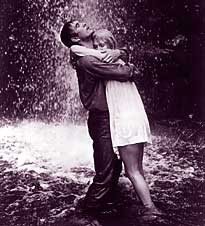Ken Loach, famed documenter of the British
working class, has spent his career making radical films that
examine all aspects of the British social system, from government
agencies to the economic strata in which people live their lives.
Some of his most celebrated and award-winning films will screen
at BAMcinematek Aug. 2-18.
Loach started his career in 1964, in British television working
on a popular police series as well as "The Wednesday Play,"
a provocative anthology series that he created. The bureaucracy
of the medium got to him, and in 1967, he made his first feature
film, "Poor Cow."
And it’s been pretty much all fiction films since then, with
the exception of the period of Thatcherism (pretty much the entire
1980s) when he made a number of documentaries addressing both
political and social issues.
But Loach’s power as a filmmaker lies in the feature films and
that is where the BAM series will focus. His features are touchingly,
movingly realistic. They recall the cinema verite documentaries
of such ’60s icons as Richard Leacock and the Maysles Brothers
– he gets that close to his subjects. But since these films are
fiction, they more closely resemble the Neorealist movement of
post-World War II Italian cinema.
The three early films being shown are classic Loach, focusing
mainly on relationships, all of them dysfunctional. "Poor
Cow" has a great sense of the time in which it was made.
The soundtrack is by Donovan, and the main character, Joy, resembles
Lynn Redgrave’s mod young woman trying to live the good life
in "Georgy Girl" (1966). Joy, however, is giving birth
as the film opens and Tom (John Bindon), the father, doesn’t
even bother to show up at the hospital. When Tom winds up in
jail for trying to steal a car, Joy takes up with his friend
Dave, played by a young and beautiful Terence Stamp ("The
Collector," "Priscilla Queen of the Desert"),
who also eventually lands in the slammer.
(For his 1999 film, "The Limey," starring Stamp, director
Steven Soderbergh bought the rights to "Poor Cow" so
he could splice in scenes of the 30-years-younger Stamp for flashback
sequences. "The Limey" will be shown at BAM Aug. 7.)
Joy tries to make a go of it alone – she does have a son to support
– working in a pub, then trying her hand at modeling, where it
seems she has to model underwear for creepy guys with cameras.
When Tom comes back into her life, he beats her as he did before,
but she’s unable to get rid of him. ("He won’t leave me,"
she tells a friend.) It’s difficult, if not impossible, for her
to conceive of the idea of living alone. She admits she’s scared
to be on her own. "All you need is a man, a baby, a couple
of nice rooms to live in," Joy says. This is what she’s
been raised to think – hell, it’s what most girls were raised
to think at the time. Why should Joy be any different?
Loach shoots it all with a documentarian’s hand – he’s like a
fly on the wall. We don’t need bells and whistles to be moved
by her plight.
"Kes" (1969) follows an alienated boy as he tries to
make his way through his teen years. Fourteen-year-old Billy
gets into trouble with the law and with his school, and his family
has no idea how to deal with him, nor any desire to figure out
how to help him. He finds salvation himself, in the form of a
small, wild falcon, a kestrel. Here again Loach uses a stark
realism mixed with genuine warmth to focus on the travails of
the working class.
"Family Life" (1971) draws a stark portrait of a daughter
in the process of mental collapse. It plays like a case history:
Janice is an ordinary young woman with just a bit of the rebel
in her. Her parents see it as something to be psychologically
driven out of her, and so they send her to a mental institution.
This is not as bad as it sounds – while she is under the care
of a compassionate therapist.
When he is tossed from the hospital, however, Janice undergoes
shock treatment and more. Instead of coming out of her malaise,
she spirals deeper and deeper into mental breakdown. Here Loach
uses many non-professional actors, as well as a real therapist
as he indicts the medical community’s inability to accept new
ways of dealing with mental illness.
While one is hard pressed to find optimistic moments in Loach’s
early work (although, they do exist), once he started feature
filmmaking again in the 1990s, optimism found its way into his
films. (Maybe it was the departure of Margaret Thatcher.) While
the plot of "Raining Stones" (1993) revolves around
the unemployed Bob’s attempts to get his daughter the communion
dress she dreams of (and getting into bed with an oily loan shark
in the process), the film is actually a celebration of the dignity
of the working classes of the north of England. And there is
humor, as well: every plan of Bob’s to get cash seems to fail.
(He steals sheep, but can’t sell them.) Here Loach exposes us
to the whole person – warts, wit, warmth and all.
And there’s humor to be found in "Riff-Raff" (1991),
which stars Robert Carlyle ("Trainspotting," "The
Full Monty") as a Glaswegian construction worker who, along
with his working class English and West Indian immigrant co-workers,
discover the somber realities of their lives and loves while
toiling in a slapstick-like work site.
Loach also got very prolific – he followed "Raining Stones"
up with "Ladybird, Ladybird," a heartbreaking film
based on a true story. Crissy Rock won a best actress award at
the Berlin Film Festival in 1994 for her portrait of a mother
who loves her children, but can’t manage to keep them. The welfare
system takes them away from her when she leaves them locked at
home to go for a job and a fire breaks out in the building. Maggie
is no saint, but the system seems designed to keep her in her
wretched place. And her own emotional instability leads her to
lash out in a rage at the system as well as Jorge, the one boyfriend
who seems to have a positive impact on her. Loach’s take on most
governmental and social systems is that they seem intent on punishing
instead of improving people and their lives.
"My Name is Joe" (1998) is another view of people struggling
within the system, but here the struggle is an internal one.
Joe is a recovering alcoholic, and he is well on the way to changing
his life – he coaches a losing, but energetic, soccer team, takes
Liam, a young former junkie, under his wing, and he meets and
romances a middle class health care worker. But when trouble
brews for his young charge, Joe risks his relationship, as well
as his own recovery, when he offers to work for Liam’s former
dealer. These characters know how the system works and what they
need to do to save themselves; Joe’s problem is his own generosity
of spirit in trying to take care of all those around him and
neglecting himself.
Last month, the 66-year-old Loach received the Irene Diamond
Lifetime Achievement Award by the Human Rights Watch International
Film Festival for his work chronicling the pains and rewards
of the working class, but his films have been garnering accolades
for years. Five of the films shown in the series – "Kes,"
"Raining Stones," "Ladybird, Ladybird," the
Spanish Civil War epic "Land and Freedom" (1995) and
"My Name is Joe" – were shown in the New York Film
Festival the years of their release.
Awards from international festivals have always been plentiful
for Loach – in addition to actress Rock’s award in Berlin, Glaswegian
actor Peter Mullan of "My Name is Joe" received the
Best Actor award in Cannes in ’98, and that festival awarded
its Special Jury Prize to "Raining Stones" in ’93 and
to "Hidden Agenda" in ’90. The controversial "Hidden
Agenda" addresses the "troubles" in Northern Ireland,
and is one of the few Loach films to boast an almost all-star
cast: Frances McDormand, Brian Cox and Brad Dourif.
And the recognition hasn’t stopped with the films in BAM’s series.
"Sweet Sixteen," his latest film, took home the best
screenplay award at Cannes in May.
These important works get only rare screenings in New York. (The
Film Society of Lincoln Center presented a retrospective back
in 1993.) The BAM series presents an opportunity to see the work
of a compassionate filmmaker completely in touch with real people.
Marian Masone is the associate
director of programming for the Film Society of Lincoln Center
and chief curator of The New York Video Festival also at Lincoln
Center.
BAMcinematek will screen "The Feature
Films of Ken Loach" at BAM Rose Cinemas (30 Lafayette Ave.
at Ashland Place in Fort Greene) Aug. 2-18. Tickets are $9, $6
seniors, children under 12 and students with a valid ID (Mondays
through Thursdays). For a schedule of dates and screening times
visit www.bam.org on the Web or call (718) 636-4100.

























